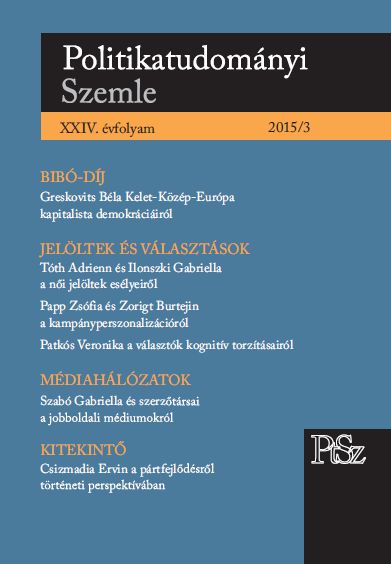Önigazolás és vágyvezérelt gondolkodás. Kognitív torzítások a választói döntésekben a 2014-es választások során
Self-Justification and Wishful Thinking in Voter’s Decisions int he 2014 Elections
Author(s): Veronika PatkósSubject(s): Politics / Political Sciences
Published by: MTA Politikai Tudományi Intézete
Keywords: Electoral behaviour; rationalisation; wishful thinking; sefljustification; experimental method;
Summary/Abstract: This paper investigates cognitive biases in voters’ thinking employing an experimental method. It aims at mapping the relationships in voters’ mind between the perceived quality and the winning probability of the chosen party, and also how that connection infl uenced the act of voting itself. The research replicates two former researches on a sample of Hungarian voters surveyed during the 2014 elections. Regan and Kilduff (1988) showed that voters attribute signifi cantly higher winning chances to the chosen party after voting than immediately beforehand, while Frenkel and Doob (1976) found that voting enhances not only perceived winning probabilities, but also the attractiveness of the party. However, the present research did not fi nd such a relationship. The act of voting does not have an effect either on winning probabilities, or on the attractiveness of parties. However, there is a relationship between perceived winning probabilities and attractiveness of parties. Even though the applied experimental design is not adequate to explore the exact causal mechanism, the paper provides arguments to both possibilities. On the one hand, there is a wishful thinking effect present, meaning that voters think very optimistically about winning chances of the supported party, and, on the other hand, voters engage in anticipatory rationalization: they see the supported party as less attractive when it is not likely to win and more attractive if it has goodwinning chances.
Journal: Politikatudományi Szemle
- Issue Year: XXIV/2015
- Issue No: 3
- Page Range: 75-95
- Page Count: 21
- Language: Hungarian

